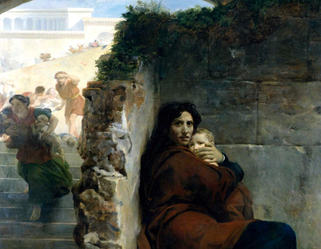|
It was a Christmas service a number of years ago. My daughter, Amanda, reflecting on all the nice music and singing, then she noticed there was a decorated Christmas Tree with (probably fake, empty) wrapped boxes scattered around the base––very much out of place in a church, but nice. Quaint. But not an image of the original Christmas story. She wrote on a scratch piece of paper she found in the pew:
Yet, we continue to underestimate our unbelieving neighbors and friends. We can often dismiss the possibility that, in their own way, they might actually be seriously seeking answers—ultimate answers about life, faith, and death. Often, it is one particular version of Christianity that is rejected as the place to discover the answer to their seeking questions. Christian sociologist Os Guinness writes that to the believer Christianity “was once life’s central mystery, its worship life’s most awesome experience, its faith life’s broadest canopy of meaning . . .” But, today, he laments, no matter how passionate or committed an individual believer may be, Christianity often amounts to little more than a private preference, a spare time hobby. For serious seekers, such spare-time faith is not a solution to their deepest needs. Christianity must be more than a cozy warm blanket, something more ultimate to raise one up above one’s needs. Amid the glad tidings often associated with the Christmas story is an oft-missed dose of “reality” etched into biblical scene. Along with shouts of exultation from shepherds, homage from wise men, angels praising God, there is another voice often missed: “a voice heard in Ramah, wailing and loud lamentation, Rachel weeping for her children…refusing to be consoled, because [her children] were no more” (Matt 2:18). These are strange words coming in the midst of this joyous occasion. Yet, they are a reminder that lament and despair grip the human experience. The first time we meet Rachel is that wonderful moment when she thought she would be marrying the love of her life, the OT patriarch Jacob. But the story turns quickly to despair: Her father tricks Jacob into marrying Leah, Rachel’s older sister, first. Making matters worse, Leah has eight sons as Rachel remained childless; and, then, we hear her weigh the depths of her barrenness. God eventually takes Rachel’s reproach away by giving her a son, Joseph, Israel’s future deliverer. But, while giving birth to her second son she hears news that Joseph, her first-born, had been murdered. We, then, learn that “Rachel began to give birth and had great difficulty” and reflecting on her anguish, she names her new son “trouble” (Benjamin) and dies and is buried by the roadside on the way to Bethlehem. The roots undergirding the story, as well as the original Christmas story in our Gospels, are surrounded by the swing between gladness and suffering, between hope and despair. The realities of life. The original Christmas narrative—the one that is inspired and finds a place in Scriptures—forces the reader back to the Rachel story, compelling us to include lament in the Christmas story. Certainly the Gospel writer wants us to know that God has sent his only begotten Son to be the deliverer of all mankind, the ultimate Joseph. Yet, Rachel and her cry seep into the first Christmas story. We need to know that despite joyous strains elsewhere, some refuse to be comforted except only by God’s own intervention. The Gospel story is pictured in Rachel’s cry, that is, of God’s Son ending up on a cross, rejected, and dying the cruelest of deaths. The reality of life, its pain and often unfairness, demand that one must turn to the God of Golgotha, that lonely hill where hanging between two thieves, the innocent Lamb of God was slain, who alone can provide the relief, the comfort we deeply need; not simply mere sentimentalism, a Hallmark Card, or a “spare-time” religious experiences. No other hope other than God’s work in Christ can penetrate our neighbor’s or our own deepest hurts or pierce our loneliest moments, or lift us above our needs. Amid the tinsel and cheerfully wrapped presents, let us remember Christ’s birth wasn’t to increase retail, but to bring good news that would meet the deepest needs of the human experience. Our unbelieving, skeptical friends and neighbors deserve no less. And in this, they might find the real Christianity, and the hope they long for.
0 Comments
 I am accused of being a Christmas curmudgeon, a grumpy older man who is down on Christmas cheer . . . I get it . . . some might even be thinking to themselves, “When is he going to talk about the joy of Christmas?” Well, I get we need joy. I had a great childhood and Christmas for me was marvelous, incredible . . . my childhood stepfather (as some of you know) was the heir of a Toy Company, the Gotham Steel Toy Company in fact . . . and I received amazing Christmas presents! I was a very popular neighborhood kid at Christmas time. So, I get it. Christmas is supposed to be this wonderful, joyous, marvelous time of year. But . . . I am no longer that privileged child. I no longer have the luxury to think as a child. This season for many is a reminder of what is lacking, that someone is missing; a time of shame, loneliness, heart-brokenness . . . and everywhere one turns they are told that they should feel joy . . . even at church. Yes, the original story has joy it in . . . but this is no commercial, consumer joy, or joy induced by decorations and nice music and great deals at Target. Yes, Elizabeth is told she will have “great joy” at the birth of John . . . but this “joy” is because her childless-shame would be finally taken away. Yes, as in our text this morning, the wise-men from the East have joy in seeing the Star, but we forget this is in the midst of a story about an jealous King who declares treason on this babe born outback in a stable, a story that ends with the slaughter of innocent children two and under, a story of exile and running away to seek safety in a foreign land. The real Christmas story is far closer to the reality of so many populations of people on this plant, the bottom-billion, than the commercial one we are surrounded by and the one presented by us in church. Frankly, the poor homeless on the street, under the bridge, off in a corner seeking shelter from the elements have more in common with the original Christmas story than most of our resource-rich Christmas experience. And strangely, us, churches often harness the commercial version and Christmas consumerism to get people into our buildings at this season, when it is the original story they need, need for life now and for their soul, for there is eternity at stake in this original Christmas story. Part 2 tomorrow . . .
If we turn the “poor in Spirit,” “those who mourn,” and “those who are meek” into “everyone who recognizes they are poor in spirit” and “we all mourn” and “we are all meek before God,” we rob the poor, the mourning, and the meek from the empowering words Jesus spoke. We rob the rich and powerful of the repentance and new vision of the kingdom that Jesus calls them to. We literally have taken the poor out of the “poor” and the mourning away from “those who mourn” and have turned everyone into being meek. We need to hear these beatitudes as if we are a part of that crowd (Matthew 4:23-5:3ff).
|
AuthorChip M. Anderson, advocate for biblical social action; pastor of an urban church plant in the Hill neighborhood of New Haven, CT; husband, father, author, former Greek & NT professor; and, 19 years involved with social action. Archives
February 2024
Categories
All
|
Pages |
More Pages |
|


 RSS Feed
RSS Feed